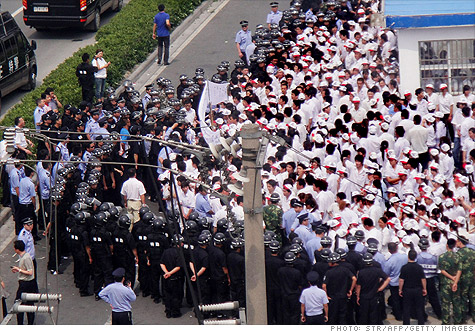As the economic landscape in China continues to shift, an awakening working class is demanding fair treatment and higher wages—and the movement is picking up steam.
The Associated Press on Monday highlighted the emerging resistance to workplace exploitation and authoritarian government policies that has steadily grown over the past four years, with numbers of strikers doubling annually since 2011 until they reached more than 1,300 last year.
Shi Jieying, a handbag factory worker who took part in a strike last month which ended in a shutdown by riot police, told the AP on Monday, “I didn’t think of it as protesting, just defending our rights.”
Only through the proliferation of social media in China did Shi learn that she was entitled to social security funding and a housing allowance, the AP writes.
Duan Yi, a leading Chinese labor lawyer, told the AP, “What we are seeing is the forming of China’s labor movement in a real sense.”
China’s labor law, which went into effect in 1995, guarantees the right to a decent wage, rest periods, no excessive overtime, and the right of collective bargaining. However, workers may only strike under the banner of the state-run All China Federation of Trade Unions (ACFTU), the country’s sole legally recognized union, which is seen by critics as an ineffective body that represents government and employer interests.
As In These Times explains, recent protests have been launched without the authorization of the ACFTU, leaving workers without an organizational structure for their movement and vulnerable to hostile reactions from the government, which is adverse to grassroots movements that can threaten the ruling party’s hold.
In These Times continues:

